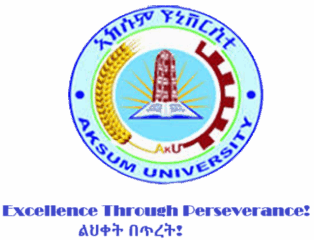🌾 College of Agriculture Administration
Welcome to the College of Agriculture at Aksum University! Situated in an agrarian region, our college is committed to advancing agricultural science, technology, and economics to enhance food security, promote sustainable land use, and improve the livelihoods of farming communities in Ethiopia. Our administrative team diligently supports education, research, and outreach efforts in these vital areas.
We’re committed to:
- Developing innovative agricultural practices and technologies
- Training highly skilled agricultural professionals and researchers
- Contributing to food security and rural development in Ethiopia
We collaborate closely with our faculty, students, farmers, agricultural research centers, government ministries (such as the Ministry of Agriculture), and NGOs. Our efforts are aligned with national agricultural development policies, focusing on climate-smart agriculture, increased productivity, and resilient food systems relevant to Tigray and wider Ethiopia.
👤 Administrative Structure – Click to Learn More!
Explore the key roles within our leadership team:
Provides overall leadership and strategic direction for the College, promoting its vision in agricultural science, food production, and rural development.
Oversees all academic programs, curriculum development, and quality assurance across the College’s various departments, ensuring robust agricultural education and practical training.
Prepares and monitors the College’s budget and expenditures, ensuring efficient resource allocation for agricultural research plots, laboratory equipment, fieldwork, and administrative needs.
Handles recruitment, staff welfare, and general administrative services within the College, supporting a conducive environment for agricultural education and research.
Supports agricultural research initiatives, fosters partnerships with farming communities and agricultural organizations, and coordinates extension programs focused on sustainable farming practices and technology transfer.
Ensures that academic standards, field practical quality, and program accreditation are met and maintained across all departments, focusing on practical skills development, research integrity, and relevance to agricultural industry needs.
Roles and Responsibilities
🎓 Academic Management – Explore Our Departments!
The College of Agriculture offers a wide array of undergraduate and postgraduate programs designed to equip students with specialized knowledge and practical skills for modern agriculture. Click on a department to learn more:
- BSc in Plant Science
- MSc in Agronomy, Horticulture, Crop Protection, etc.
- BSc in Soil Science and Watershed Management
- MSc in Soil Science, Water Resource Management, etc.
- BSc in Animal Production and Technology
- MSc in Animal Breeding and Genetics, Animal Nutrition, etc.
- BSc in Agricultural Economics
- MSc in Agricultural Economics, Rural Development, Agribusiness Management, etc.
Key Academic Responsibilities:
- Coordinating program development, ensuring alignment with national agricultural policies, food security strategies, and environmental conservation efforts.
- Managing course scheduling, practical fieldwork, and faculty assignments to optimize theoretical understanding and hands-on agricultural skills development.
- Supervising curriculum review, development, and accreditation processes to ensure quality, innovation, and relevance to current agricultural challenges and opportunities.
- Supporting faculty development, promoting applied agricultural research, and evaluating performance in both teaching and extension activities.
- Managing student admissions, academic records, and graduation processes in coordination with university-level offices.
💼 Administrative Operations
- Developing and managing the College’s annual budget in line with university policies and strategic priorities, particularly for agricultural research farms, laboratory facilities, farm machinery, and extension services.
- Overseeing procurement, infrastructure development (e.g., greenhouses, animal pens, irrigation systems), and efficient resource utilization for academic, research, and administrative needs across all departments.
- Implementing university-wide administrative policies and procedures to ensure smooth operations and compliance with agricultural and environmental regulations.
- Facilitating effective communication and collaboration between departments, and with farmers’ cooperatives, agricultural businesses, and government extension services.
👥 Student Services
- Assisting students with academic advising, course selection, and practical attachment guidance, including support for field training and thesis research.
- Organizing student orientations, career guidance (e.g., in farm management, agricultural research, extension services, agribusiness, rural development), and extensive opportunities for practical experience in various farming systems.
- Addressing student concerns, promoting student welfare, and fostering an inclusive and supportive learning environment that encourages innovation, sustainability, and community engagement in agriculture.
- Supporting student agricultural clubs, farm visits, and community service projects.
🔬 Research and Community Engagement
- Encouraging staff and student-led agricultural research in areas critical to food security and rural development in Tigray, Ethiopia, such as crop improvement, soil fertility management, livestock health and productivity, value chain development, and agricultural policy analysis.
- Establishing strong partnerships with local farming communities, agricultural research institutes, NGOs, and relevant government bodies (e.g., Bureaus of Agriculture, Rural Development) to foster collaborative research, provide expert consultancy, and facilitate knowledge transfer.
- Hosting farmers’ field days, agricultural workshops, public lectures, and extension programs that contribute to improving farming practices, promoting sustainable resource management, and addressing real-world agricultural challenges.
- Facilitating the publication and dissemination of research findings to inform agricultural policy and practice.
